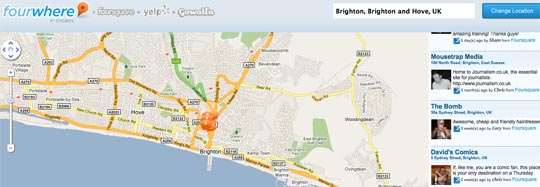Fourwhere, a location-based search service, first launched a few months ago with data from geolocation gaming service Foursquare. Now it has developed its service to also include data from other location services, Yelp and Gowalla.
The mapping service, launched at the SXSW technology conference in Austin, now has arrangements with Foursquare and Gowalla to allow extra access to information, and says it’s in discussions with Yelp for unrestricted access to its platform.
Fourwhere says it can match different service updates on the same venue, even if the services are not using a standardised naming or location convention. Following the latest update, Cnet’s Josh Lowensohn pointed out a few of the glitches, but also said:
Despite the current shortcomings, I really like the idea of having one place that aggregates not only the tips from these sites, but, more importantly, the check-ins. When done right, and given a sense of time, Fourwhere could prove itself as a very powerful tool for showing what’s hot and what’s not based on a much larger group of users than any of the three services could offer on their own.
I asked Sysomos, the social media monitoring and analytics company behind Fourwhere, how the service would be useful to journalists.
“Fourwhere will make it easy for journalists to see what is going on at certain locations,” says community manager Sheldon Levine. It can provide insight as to what’s going on from the people actually there, he says.
“It can even help them search out locations where something interesting is happening and with story ideas by seeing where people in their markets are, and what they are talking about while there.
“Fourwhere will help connect all kinds of users, from those on the ground to, say journalists, making it easier for everyone to see what’s going on around them.”
I’ve taken a grab to show how it looks for the area around the Journalism.co.uk office in Brighton. Admittedly, some of the updates are out of date by several months, but that’s probably due to low level user-activity. I was briefly excited by the promise of free beer at a local pub, before realising someone had made the comment six months ago.
But, imagine a lot more people were using these services in a concentrated area, with more regular updates. It’s not just the comments: as Paul Bradshaw commented in a post about Foursquare, location based services give you an extra layer of information: frequency of visits etc.
I’ll be keeping an eye on Fourwhere, and on Twitter’s development of Twitter Places, which will also be integrated with Foursquare and Gowalla.
As more people embrace these location-based services and use them more creatively, the more useful they could become for journalists.
On Friday, at Journalism.co.uk’s news:rewired event Yelp’s head of European community management, Miriam Warren, will be talking about mobile and the development of Yelp’s online review service.
Yelp, which now attracts over 32 million monthly unique visitors to its online reviews, has recently developed new version of the Yelp iPhone app: when a user checks-in to a combination of businesses, they will be able to earn “Yelp Badges”. More details at this link.
Publishers who offer similar review or local information services might be interested to see what and how Yelp is developing, while news journalists might consider how they could use Yelp and other location-based products to feed their stories and make contacts.

